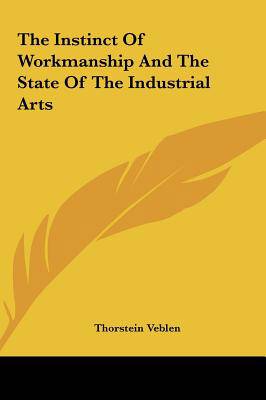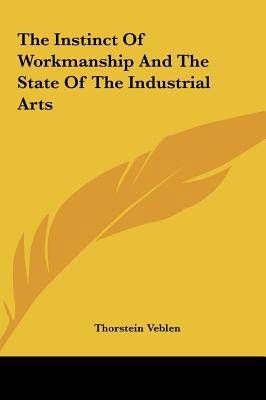
- Retrait gratuit dans votre magasin Club
- 7.000.000 titres dans notre catalogue
- Payer en toute sécurité
- Toujours un magasin près de chez vous
- Retrait gratuit dans votre magasin Club
- 7.000.000 titres dans notre catalogue
- Payer en toute sécurité
- Toujours un magasin près de chez vous
The Instinct Of Workmanship And The State Of The Industrial Arts
Thorstein Veblen
Livre relié | Anglais
58,45 €
+ 116 points
Format
Description
""The Instinct of Workmanship and the State of the Industrial Arts"" is a book written by Thorstein Veblen, an American economist and sociologist. The book was first published in 1914 and explores the relationship between the human instinct of workmanship and the state of industrial arts. Veblen argues that the instinct of workmanship is a fundamental human drive that motivates individuals to create and improve their surroundings. He also discusses how the state of industrial arts, or the level of technology and craftsmanship in a society, can either foster or hinder the development of this instinct. Veblen critiques the industrial system of his time, which he believes prioritizes profit over the quality of goods and the satisfaction of workers. He suggests that a shift towards a more cooperative and creative system could improve both the state of industrial arts and the well-being of individuals. Overall, ""The Instinct of Workmanship and the State of the Industrial Arts"" is a thought-provoking analysis of the relationship between human nature and the modern industrial system.In the ordinary course, it should seem, such an advance in the industrial arts as will result in an accumulation of wealth, a considerable and efficient industrial equipment, or in a systematic and permanent cultivation of the soil or an extensive breeding of herds or flocks, will also bring on ownership and property rights bearing on these valuable goods, or on the workmen, or on the land employed in their production. What has seemed the most natural and obvious beginnings of property rights, in the view of those economists who have taken an interest in the matter, is the storing up of valuables by such of the ancient workmen as were enabled, by efficiency, diligence or fortuitous gains, to produce somewhat more than their current consumption.This scarce antiquarian book is a facsimile reprint of the old original and may contain some imperfections such as library marks and notations. Because we believe this work is culturally important, we have made it available as part of our commitment for protecting, preserving, and promoting the world's literature in affordable, high quality, modern editions, that are true to their original work.
Spécifications
Parties prenantes
- Auteur(s) :
- Editeur:
Contenu
- Nombre de pages :
- 228
- Langue:
- Anglais
Caractéristiques
- EAN:
- 9781161466973
- Date de parution :
- 23-05-10
- Format:
- Livre relié
- Format numérique:
- Genaaid
- Dimensions :
- 178 mm x 254 mm
- Poids :
- 612 g







